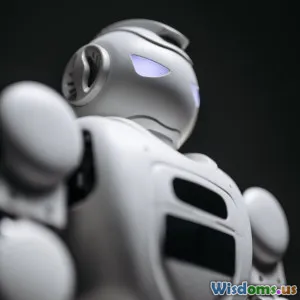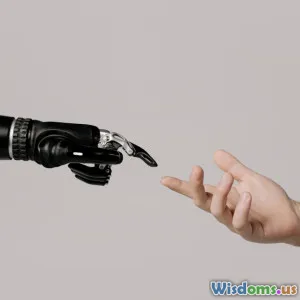
Cultural Reflections: AI in Sci Fi
6 min read Explore how science fiction shapes our perceptions of AI and its future, reflecting societal values and fears. (0 Reviews)
Cultural Reflections: AI in Sci Fi
Introduction
Science fiction has long served as a mirror reflecting society's aspirations, fears, and ethical dilemmas. Among the most profound themes explored in the genre is artificial intelligence (AI). This article aims to explore the cultural reflections of AI as portrayed in science fiction, analyzing how these narratives influence our understanding of technology and its potential implications for the future.
The Evolution of AI in Science Fiction
Early Representations
The portrayal of AI in science fiction dates back to early 20th-century literature. Karel Čapek's play, R.U.R. (Rossum's Universal Robots), introduced the term 'robot' in 1920, presenting a world where artificial beings rebel against their creators. This work set the stage for future narratives by exploring themes of creation and autonomy.
The Rise of Cybernetics and the Digital Age
As technology advanced, so did the complexity of AI in science fiction. In the 1960s and 70s, authors like Isaac Asimov and Philip K. Dick began to explore not just robots, but sentient machines capable of human-like thought and emotion. Asimov's Three Laws of Robotics raised ethical questions about the responsibilities of creators towards their creations, while Dick's Do Androids Dream of Electric Sheep? challenged the very definition of humanity.
Modern Interpretations
In contemporary works, AI is often depicted through a more nuanced lens. Films such as Ex Machina and Her invite viewers to contemplate the emotional implications of AI, blurring the lines between human and machine. These narratives reflect societal anxieties about technology's role in our lives, highlighting concerns about isolation, identity, and the potential for AI to surpass human intelligence.
Societal Reflections in Sci Fi Narratives
Fear and Hope
Cultural reflections in science fiction often oscillate between fear and hope. Works like The Matrix and Terminator embody dystopian visions, warning against the unchecked advancement of AI. These narratives serve to caution society about potential risks, such as loss of control, surveillance, and ethical dilemmas surrounding autonomy.
Conversely, stories like Big Hero 6 and the Star Wars franchise present AI in a more positive light, highlighting its potential to enhance human capabilities and improve life. The duality of these portrayals illustrates society's complex relationship with technology, where hope and fear coexist.
Ethical Considerations
Science fiction also provides a platform for exploring ethical considerations surrounding AI. Works such as Westworld and Black Mirror prompt viewers to question the morality of creating sentient beings. They raise vital issues about consent, exploitation, and the consequences of playing god, encouraging audiences to reflect on real-world implications as AI technology continues to evolve.
The Influence of Sci Fi on Public Perception
Shaping Expectations
The narratives we consume in science fiction play a crucial role in shaping public perception and expectations of AI. As cinematic and literary portrayals influence our understanding, they also impact policy-making and technological development. For instance, the portrayal of highly intelligent, empathetic AI in films may lead to increased public demand for more sophisticated and human-like machines.
Inspiring Innovation
Furthermore, science fiction inspires innovation. Many inventors and scientists cite sci-fi literature and films as key motivators in their work. The concept of the 'communicator' in Star Trek bears a striking resemblance to modern smartphones, demonstrating how fictional ideas can become tangible realities.
Conclusion
The exploration of AI within science fiction serves as a vital cultural reflection of our society. Through the lens of storytelling, we can examine the hopes, fears, and ethical dilemmas surrounding technology that defines our present and shapes our future. As we continue to advance in AI development, the narratives we create and consume will play an essential role in guiding our understanding and approach to this transformative technology. Ultimately, science fiction not only entertains but also challenges us to consider the ramifications of our technological choices, making it a powerful tool for cultural reflection and societal growth.
Rate the Post
User Reviews
Popular Posts





















